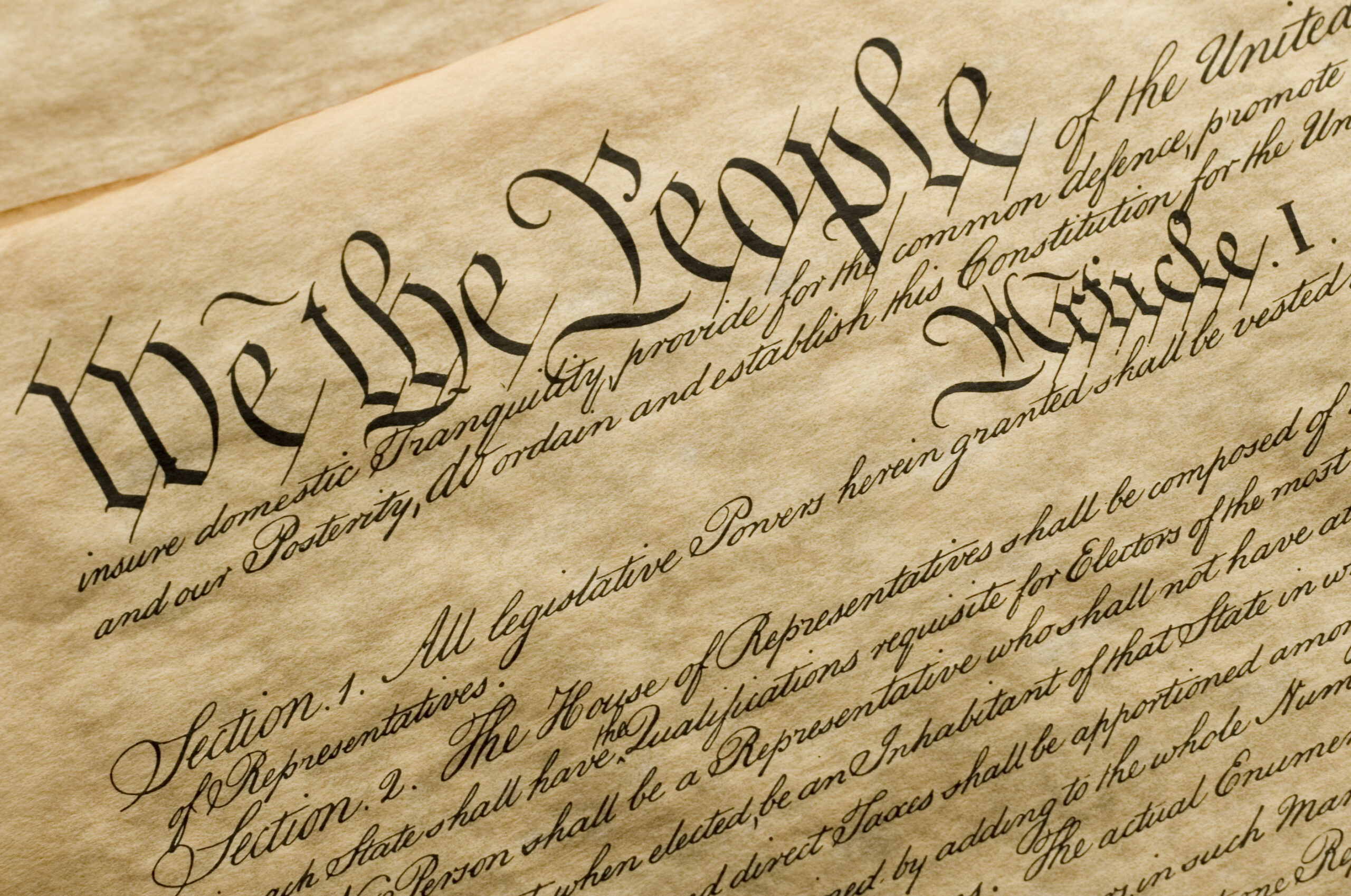Hunkering down in red states is not enough.
Not Just Any Rights

An overemphasis on abstraction and individualism is what got us into this mess.
As a sample of his engaging new book, War on the American Republic (WAR), Kevin Slack has laid out an energizing roadmap for the New Right. A recovery of Western Christianity and its concomitant worldview as the foundation for American civilization and the means of “moral aggression”; a reinvigoration of republican virtue; true citizenship as the antidote to corrupt national bureaucracy; and “genuine nationalism” over and against “false patriotism and tribalism.” All this is most welcome. Slack rightly indicts the over-intellectualized conservatism of yesteryear for its inattentiveness to action, its penchant for in-house theory—endless academic programs, conferences, and panels to no end—and effeminate aversion to conflict. WAR deserves three cheers for its masculine, overtly Christian, and unapologetically American mood, not to mention its fiery prose. Slack isn’t squeamish about asserting nationalist economic policy or protectionist immigration restrictions.
Like many New Right commentators, Slack is best at issue spotting. That is, he is a peerless critic of the conservative malaise, and amoral progressive insanity, that is the impetus for the nascent New Right. This is no less true of Slack’s jabs at the conservative legal movement (CLM), always dominated by libertarians, and to which so much intellectual capital has been expended over the past several decades with negligible returns.
Given the illegitimacy of our current “kleptocracy” amidst a “managed national decline,” Slack is right to note the increasingly farcical nature of “legal appeals to the Constitution and precedent.” Originalism and “judicial engagement” as dueling jurisprudential theories have produced not-so-dueling results, viz., simultaneously bloated bureaucracy and a web of regulatory exemptions that empower predatory, unaccountable corporate monopolies. Hence, kleptocracy.
On the cultural side, the textualist justices tell us that transgenderism is retroactively protected by statutes enacted in 1964, and “conservative” judicial minimalists are indifferent to Christian petitions for relief from the whims of the demonstrably devious medical industrial complex.
Proceduralist dogmas no longer satisfy (or pacify) the New Right, which has discovered, despite the best efforts of Conservatism, Inc., that there is more to jurisprudence and, indeed, the American constitutional order, than pre-approved curations of The Federalist Papers. The wall of separation between law and politics has also been scaled. And, as Slack says, “conservative political idols” have been “smashed,” including the attenuated form of founder-worship that relied on tendentious selective appeals to the private musings of a few household names without giving attention to historical context—a popular psyop used by 20th-century progressive historians.
But for all his welcome chastisement of CLM, Slack formulates no approach of his own to compete with Federalist Society dogma or rival what Adrian Vermeule and Josh Hammer have sketched out. To be fair, Slack’s focus is not legal theory or constitutional history per se. What we do find is an uncharacteristic understatement of the problem flagged and a surprising embrace of half-baked constitutional theory that got us to the place Slack laments. Quibbling is in order here.
Men, Not Mankind
In a way, Slack’s dispersed treatment of the American Constitution signals an outdated—by New Right standards—and ahistorical understanding. If accepted, it threatens to return us to the preconditions for the present moral crisis.
Slack’s most direct if terse statement on this front: “The Constitution aimed to protect natural rights; now it is used to subvert them.” The Constitution has been inverted contrary to its chief, if not singular, purpose, he argues. But there are glaring problems with Slack’s view.
First, what Slack intends by “natural rights” is not clear.
The scope of Slack’s “natural rights” is seemingly limited to the individual, excluding the communal and ignoring the historical-cultural conditioning of particular expressions of the natural and universal inside of time. This is not a positivist point: someone has to land the plane, as it were. Natural law always and everywhere requires particularization and application.
More to the point, Slack’s excerpt as it stands insinuates that the general consensus of 1776 and 1787 was that the colonists were crusading for the rights of mankind rather than for the liberties of Englishmen, that is, traditional, conventional rights nevertheless established upon, and congruent with, the natural law—for there is no right or sanction untethered from the higher law. On the contrary, George Mason stated this plainly: “We claim nothing but the liberty and privileges of Englishmen in the same degree, as if we had continued among our brethren in Great Britain.”
James Otis argued in 1763 simply for the “natural, essential, inherent and inseparable rights” of British subjects. These included certain expectations of governance: legislative powers lodged in the “hands where the community have once rightfully placed them,” fair representation of interests in said legislature (i.e., Parliament), non-transference of that legislative power to “any other hands,” and that the property of British subjects would not be taken without consent nor would they be subjected to tyranny (i.e., arbitrary laws) or slavery. Likewise, taxes could only be levied by the consent of subjects or by deputation. Laws had to be clearly promulgated and “should have no other end ultimately, but the good of the people.”
Elsewhere Otis frequently cited the maxim salus populi est suprema lex to similar effect. The purpose of law and, indeed, of government as lawgiver is the good of the people, their welfare and security. Otis’s litany of rights is comprised of the most basic Thomistic definition of law coupled with a basic respect for property and certain decidedly English traditional structural and representational norms.
Samuel Adams affirmed all that Otis had suggested and further rooted the natural rights of life, liberty, and property in the more basic right to self-preservation, “commonly called the first law of nature.” Adams considered these rights “branches of, rather than deductions from,” this first duty. But whether “branches” or “deductions,” these outgrowths of self-preservation are not everywhere and alike expounded or protected in the course of human history. The right to bear arms is dependent on the basic natural law provision for self-preservation, but the right for citizens to possess firearms for this end, or the right of townships to raise militias for the same, is not at all obvious; it may flow as a good but not as a necessary consequence from a higher principle. Countries that permit no such right have not per se run afoul of the natural law. The other Adams, John, didn’t refer to the maintenance of arms as a “right” at all in his Thoughts on Government (1776), but rather a “prudent,” possibly even “indispensable,” duty of able men given the political circumstances.
Moreover, non-Western, pagan nations would not, for example, conceive of any such rights as entitlements from “the eternal and immutable laws of God and nature,” as Samuel Adams did; a background, Christian metaphysic is required for that. And in the case of America, a specifically Protestant ethos, as the limitation on religious tolerance and the like was in play. Justification for resistance to certain incursions into colonial sovereignty were rooted in Protestant identity, as the Suffolk Resolves (1774) made explicit.
A Constitution in Common
I could go on, but the Constitution, being fitted for a particular people, was not merely constructed for protecting natural rights which, at a sufficient degree of abstraction, are due every man in some form. Rather, the Constitution was intended for a specific people and place conditioned by their history, custom, and traditions—nomos coupled with ethnos. That is, insofar as the Constitution has natural rights in view, they are discernible only through a lens colored by 18th-century English expectations. It was not formed to defend natural rights simpliciter. Doubtless, protection of life and property was and is a basic function of government, but that does not exhaust the American constitutional order, nor does it fix the meaning of “liberty” and other underdetermined terms of art.
The reason the cultural-historical texture, the contingent and conventional nature, of the rights, privileges, and immunities is important to emphasize—indeed, to insist upon—is because without it there is no limiting principle on rights claims. And, in the end, exactly what Slack laments will be, and has been, realized, viz., the degradation of traditional American rights will be corrupted and subverted. Have we not witnessed this already?
A government constituted for the protection of natural rights is malformed. It doesn’t actually exist absent the particularization achieved only through cognizance of the people it governs. Further, we find in founding era writers like Zephaniah Swift and Nathaniel Chipman the truth that man has no rights, no life, detached from his fundamental gregariousness: “the rights of man are relative to his social nature…they exist only in coincidence with the rights of the whole.” It is not good that man should be alone. His “happiness” depends on his “connexion [sic] and union with fellow creatures.” Natural rights enjoyed in an isolated state of nature are a fiction because isolation is unnatural. Far from denying the natural law, this truth acknowledged by the best commentators of the period asserts reason derived from God’s creation, true human anthropology, something of which our dilapidated civilization stands in desperate need.
Regardless, whether “natural rights” in the Anglo-American context are properly perennial or historicist in scope, Slack overplays the Constitution’s overt textual purpose and function. The Constitution established a form of government. The common law view of constitutions, articulated by Bolingbroke in his Dissertation Upon Parties (1734), was that a “general system” of “institutions and customs, derived from certain fixed principles of reason” served as the people’s constitution or way of being and as a necessary antecedent to government form. The same antecedent determines the form and limits of government authority. Under this conception, the written constitution is merely a reflection of the prior constitution of a people, that is, the nation.
Accordingly, as Charles McIlwain understood, the first American constitutions, both state and federal, consisted “mainly of a codification of institutions and principles long in actual force. They are far less doctrinaire or a priori than those of France or the rest of continental Europe.” How could they be anything else? The federal Constitution itself is largely structural in its content and the preamble makes no mention of natural rights, individual or otherwise. Rather it echoes 18th-century convictions vis-à-vis government purpose, viz., the common good.
Generally accepted on the New Right at this juncture is this fundamental animating purpose for all good government regardless of structure, but Slack does not mention it. As the Virginia Bill of Rights put it, “The government is, or ought to be, instituted for the common benefit, protection and security of the people, nation, or community.”
Further, standing behind and with the common good is the mere survival of the people, of the polity. Hence, Massachusetts’s Constitution (1780) designated the end of government: “to secure the existence of the body-politic.” The laws of such a government must necessarily pertain to the common—not the individual—good. And the second that a government ceases to be capable of performing this duty, “the people have a right to alter the government” for that purpose. In Massachusetts, the acknowledgement of natural rights is balanced against this reality.
If the Constitution established a government, a structure for order and adjudication, it was dedicated to the good governance of a particular people. In other words, the common good not of mankind as a genus but of Americans as a species thereof. Slack fails to tap into this progression in rightist conviction, a recovery of older assumptions.
Self-Evident to Whom?
It is a disproportional emphasis on the individual, on autonomy, on abstractions, and on rights discourse that has, in many ways, gotten us into this predicament. Government is first and foremost instituted by God through the conduit of the people, the nation, for the protection thereof, for the common (not individual) benefit, and for the promotion of the good and punishment of evil. Our particular government form, reflected in our written Constitution, is conditioned by the nation which preceded it and gave it life; in turn its purpose is the preservation of the way of life that called it into being. Should it cease to do so—whether by a kleptocratic managed decline or otherwise—it loses its legitimacy. This reality does not preclude recovery or rejuvenation, and if nothing else, Slack has shown us how hard-fought such a project will be.
A reorientation toward classical conceptions of governance and society—shared with the founders—in concert with a recognition of the particularized, in some ways incommunicable, nature of our constitutional order, with all the rights and duties that seem “self-evident” to those reared in it, is the reboot the Right, and indeed the country, needs.
Nathaniel Niles, in a lengthy sermon in 1774, preached that it was “unreasonable to withstand a mob or a tyrant, or to make war on the pirates themselves” under a scheme of government predicated on private or individual interest.
“For, according to this doctrine they are none of them doing anything but what is right. Yes, say you, they infringe on my rights. I ask, what rights? None but such as you have pillaged from the community—Rights in which these very persons are interested as members of the community.”
Only within a scheme aiming at the common good—a “government perfectly consistent with the divine government, and true reason”—can we “consistently exert ourselves in favour of liberty, and punish tyrants according to their just deserts.”
The American Mind presents a range of perspectives. Views are writers’ own and do not necessarily represent those of The Claremont Institute.
The American Mind is a publication of the Claremont Institute, a non-profit 501(c)(3) organization, dedicated to restoring the principles of the American Founding to their rightful, preeminent authority in our national life. Interested in supporting our work? Gifts to the Claremont Institute are tax-deductible.
It will take an appeal to the good per se to overcome a corrupt regime.
How to navigate America’s post-American future.
There’s nothing unprecedented in a return to America’s foundational ideals.
Casting off an existing government is an exercise in considerable prudence and wisdom.
Conservatives must reassert the mores and moral virtues of self-government.






